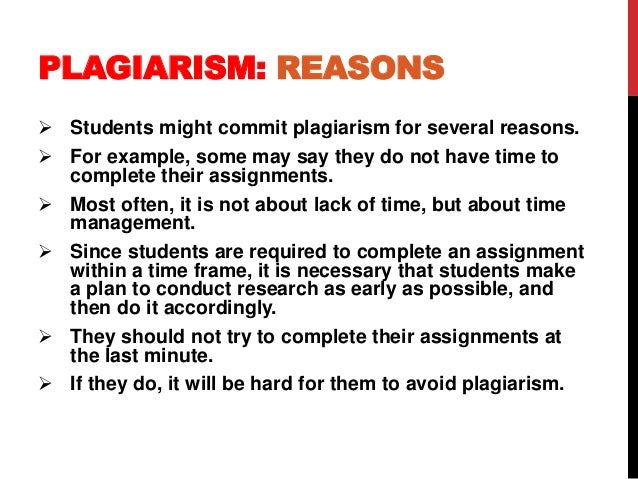
It's also important to know how plagiarism happens. The final step is to develop effective academic skills. Many students who plagiarise do so unintentionally, often because they don't have the academic skills to avoid over-reliance on the work of others or because they aren't sure what constitutes plagiarism Often times, this is very much the student’s fault. In nearly every study on why students plagiarize lack of time management is one of the top causes. Other times, it might be more complicated. If a student is working full time and/or raising children, there may simply not be enough hours in the day to complete some blogger.comted Reading Time: 6 mins Types of plagiarism. Plagiarism can involve copying words or images directly, paraphrasing sentences or passages, or co-opting someone else’s ideas without citing the original work.. In academic writing, there are various types of plagiarism you might encounter. Global plagiarism means plagiarizing an entire text. This includes purchasing an essay or turning in an assignment completed by
What is Plagiarism? | UNSW Current Students
Plagiarism at UNSW is why do students commit plagiarism? the words or ideas of why do students commit plagiarism? and passing them off as your own. Plagiarism is a type of intellectual theft. Plagiarism can take many forms, from deliberate cheating to accidentally copying from a source without acknowledgement. Consequently, whenever you use the words or ideas of another person in your work, you must acknowledge where they came from. It's important to know what plagiarism is, and what form it takes some common types of plagiarism are listed here.
It's also important to know how plagiarism happens. The final step is to develop effective academic skills. Many students who plagiarise do so unintentionally, often because they don't have the academic skills to avoid over-reliance on the work of others or because they aren't sure what constitutes plagiarism. So it's important to take every opportunity to develop your academic skills, why do students commit plagiarism?.
On this site, there are resources on avoiding plagiarism and how to be organisedas well as a list of other resources and links so students can develop good academic practice. One of the contradictions of academic writing is that, while you are expected to research and refer to experts and authorities, you are also expected to produce original work, why do students commit plagiarism?.
This is to ensure that you are very clear about your own ideas and about how the works of other scholars have influenced your understanding. It is important to recognise that all scholarship involves understanding, researching and building on existing research to some degree.
Undergraduates, for instance, often base their assignments on selecting, ordering, summarising and interpreting what others have said to support their own academic arguments. Therefore, it is important to learn how to reference wellthat is, how to why do students commit plagiarism? and clearly acknowledge the sources you have used in your work so that your own contribution can be clearly identified and appreciated.
As part of an academic community, you are expected to abide by its ethical practices. No doubt some students do cheat. But most cases of plagiarism are accidental and could be avoided if students became more conscious of their own writing and research practices. Most students who plagiarise do so unintentionally, usually because they don't have the skills to avoid over-reliance on the work of others or because they aren't sure what constitutes plagiarism.
Both intentional AND unintentional plagiarism are violations of UNSW Plagiarism Policy PDF. Contract cheating, or 'ghostwriting', is when a student engages another person to complete work for them, and then submits the work as their own, regardless if money was paid or not, why do students commit plagiarism?. Click here to learn more about contract cheating. Sign On Expand menu for Sign On Moodle myUNSW Email Microsoft Office myLibrary Careers portal Change your password Need help?
Breadcrumb Student Support Academic Skills Plagiarism. What is Plagiarism? Three steps to learning about plagiarism It's important to know what plagiarism is, and what form it takes some common types of plagiarism are listed here.
See next: Common forms of plagiarism. Why do I need to know about plagiarism? Plagiarism is unethical for three reasons: Firstly, it is unethical because it is a form of theft, why do students commit plagiarism?. Secondly, it is unethical because the plagiariser subsequently benefits from this theft. If a student gains employment on the basis of a qualification they have not earned, they may be a risk to others.
Academic Skills Referencing Plagiarism Expand menu for Plagiarism Academic integrity online module What is plagiarism? Expand why do students commit plagiarism? for What is plagiarism? Common forms of plagiarism How does plagiarism happen? Avoiding plagiarism Other plagiarism resources Writing skills Critical thinking Reading and note-taking Exam preparation More resources Workshops and courses Contacts and appointments.
See also Contract cheating.
Plagiarism: 6 different types of plagiarism to AVOID
, time: 8:24Reasons Students Plagiarize or Cheat | Academic Integrity | RIT

The study found that despite students reporting that they had a conceptual understanding of plagiarism, the majority of them reported that they had intentionally and unintentionally committed plagiarism, mainly due to pressure for good grades (%), laziness and poor time management (%), and lack of good academic writing skills (%) Understanding why students commit acts of cheating or plagiarism contributes to efforts for deterring these incidences. Students may intentionally or unintentionally cheat or plagiarize. While many dismiss the act of academic dishonesty with a simplistic: “Students cheat because they are lazy” or “Cheating is easier than working hard to What is Plagiarism? When you take someone's words or ideas and present them as your own, you commit plagiarism. Plagiarism is using the work of others but not acknowledging the source. Examples. Copying and pasting text from a web site. Copying and pasting a chart or image from a web site. Copying material from books or magazines
No comments:
Post a Comment